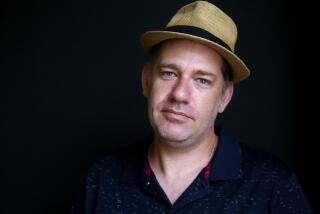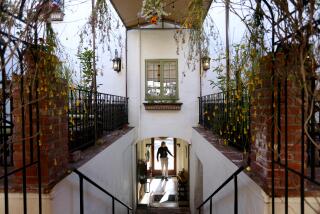Arts Plaza Donor May Be Leaving Area : Philanthropy: Father says Charles E. Probst has talked about moving. Friends state he was offended by local officials. His gift remains a question.
- Share via
THOUSAND OAKS — Reclusive millionaire Charles E. Probst may be moving out of town--raising new concerns about whether he will ever fully deliver on the $2-million donation he pledged just a year ago to the city’s Civic Arts Plaza.
Probst, 52, whose name is mounted in two-foot-high letters above the plaza’s main auditorium, has told friends that he was offended with treatment by some local officials and is looking for another place to live.
“You can see the hurt in him when you talk to him. He just feels so badly that the community has turned on him,” said former Thousand Oaks Mayor Alex Fiore, who helped secure Probst’s pledge 13 months ago. “He was considering moving out of the city.”
After hearing that Probst had failed to make a payment toward his arts center pledge, Fiore said he sought out the donor last summer at a wedding at Sherwood Country Club.
“I urged him to go forward on his pledge,” said Fiore, “because 25 or 30 years from now the naysayers are going to be gone and buried and his name will still be there on that building.”
Probst, a computer software entrepreneur and owner of a company that installs and maintains telephone systems, could not be reached for comment. Nor would his attorney comment on his client’s plans.
But Probst’s 79-year-old father, Charles J. Probst, said his son recently discussed with him a possible move out of California.
“He’s been looking around, thinking about maybe getting out of state,” the senior Probst said. Tax advantages are a principal reason, the father said.
Just what Probst plans to do became a public issue last month when Councilwoman Elois Zeanah said she had learned that Probst was reneging on his promise to give $2 million to the Civic Arts Plaza’s endowment--by far the largest of nearly $11 million in pledges to date.
Zeanah said she wants Probst’s name taken off the Charles E. Probst Center for the Performing Arts because she has been told he failed to make two $250,000 installments after an initial $250,000 contribution last fall. One was due in April and the other last month, she said.
Other city officials say they still believe Probst may meet his contractual obligations--that all the money will be paid over the next four years as promised.
“He’s been a stellar citizen,” City Manager Grant Brimhall said. “I believe he is an honorable person with honorable intentions and an honorable commitment.”
And while officers at the arts plaza’s fund-raising arm, the Alliance for the Arts, have cited confidentiality in refusing comment about Probst, they indicated last week that he may not technically be in default on his contract.
“There has not been any vote by the board of directors to set a course of action against a recalcitrant donor,” said Cheryl Collart, interim executive director at the alliance.
*
Sources close to the alliance say that contracts such as Probst’s often do not have firm payment dates and allow contributions to be made in accordance to circumstances, such as a donor’s cash flow.
Yet, the current debate follows other signs that Probst has begun to withdraw from his involvement in Ventura County.
In January, he canceled without explanation a negotiated lease of 5,600 square feet of office space in the arts plaza. The same month, his wife, Florence (Kitty) Probst, attended her last meeting as an arts alliance director even though her term did not expire until October.
In February, Probst resigned from the plaza’s governing board. And since April, the couple have sold two North Ranch houses near their estate for $2.2 million.
They also are in default on a tax payment due last April on their 16-acre estate, and they now owe about $58,000 in tax and penalties, the tax collector confirmed Thursday.
Also, Probst failed to remove a temporary wrought-iron fence around the estate by the city’s July deadline and has allowed most of his property to become overgrown with weeds--developments his attorney blames on a change of landscape contractors. Corrections have been promised by January.
*
Over that same 10-month period, attorney Charles Cohen, who has represented Probst locally during the past year, said he has written two or three letters trying to contact the hard-to-reach businessman.
“I was encouraging him to let us know what’s going on,” said Cohen, an arts alliance board member who first solicited Probst’s gift. “But I have not had any response. . . . I am disappointed in that I had hoped he would reply to me.”
“I think they have backed out of things entirely,” Fiore said of the Probsts.
Charles Probst’s disappearance from public life has been as abrupt as his rise to prominence last year.
But it is completely in character for a man who has refused public comment on his pledge and has revealed almost nothing about his past even though a prominent public building is named after him.
Intensely private, Probst had virtually no public profile until mid-1994, when his plan to landscape the hillside below his 22,000-square-foot, $8-million mansion prompted a neighborhood dispute.
Probst had hoped to spend $2 million to plant more than 900 trees, grass and shrubs, officials said. But the proposal drew fire because Probst had scraped most of his parcel clean of native vegetation in violation of a development agreement the city reached with a prior owner of the lot.
The Westlake North homeowners association also objected to the size of a large underground bunker Probst wanted to install for maintenance equipment.
Angered by the clear-cutting of native plants, city planning commissioners rejected Probst’s landscaping plan. Then, just days before Probst’s appeal came before the City Council in October, 1994, he toured the still unfinished arts plaza with Cohen and Fiore and immediately made his pledge.
*
“Right on the spot he committed to $2 million,” Fiore recalled. “He said it would be a great facility and it would be an honor to have his name associated with it.”
Fiore joined the council majority in approving the landscaping plan, only to have the 3-2 vote condemned as an act of municipal prostitution by former mayor and Probst neighbor Larry Horner.
Councilwomen Zeanah and Jaime Zukowski said they thought the timing and size of the gift created a conflict for the council. Arts alliance officials said the timing of the gift was a coincidence.
Not long after the council vote, Probst prompted another nasty argument by installing a temporary fence about 10 feet from Westlake Boulevard, not 35 feet as he had agreed to in his landscape plan.
Today, as part of the recent furor over Probst’s tardy payments, Zeanah and others have renewed the debate over whether the city compromised itself so fund-raisers for the $64-million art and government center could gain Probst’s support. “His profile is still just a question mark,” Zeanah said last week. “His name graces the most expensive building in this city--and a civic building at that--and still no one knows who he is really.”
Indeed, even as civic leaders fret about the potential loss of Probst’s money, they acknowledge that they don’t know much more about him now than a year ago.
“I don’t know of anyone he’s close to in Thousand Oaks,” Fiore said, except auto dealer Gary Nesen.
Many questions remain about what motivates Probst, where he came from and how he gained his wealth. Alliance officials have said they exercised “due diligence” in checking him out. But they will offer nothing more. And several acknowledged that they had never met Probst before the arts plaza’s 1,800-seat main auditorium was named after him.
During the 1992 construction of Probst’s monumental mansion--one of the largest in wealthy North Ranch--neighbors say they speculated that it belonged to a drug lord or Michael Jackson.
*
And last year, after Probst’s pledge, unsubstantiated rumors about the mysterious donor’s wealth included his development of a multispeed windshield wiper.
City officials and community leaders now say Probst has told others that he developed communications software that electronically moves money from one bank to another.
“We heard that he developed the software that controls the automated clearinghouse transactions between banks,” said Jim Henehan, an executive for a lighting contractor.
But another widely circulated explanation for Probst’s wealth is that he is a software whiz whose tiny Bankers Communications Co. allows telephone calls to switch from one telephone system--such as AT & T’s--to a rival’s without delay.
Probst holds no patents under his or his company’s names, federal records show. But lawyers say such an interest could be concealed under a licensing agreement with another party.
Dun and Bradstreet, a business research firm that profiles companies, identifies Probst’s firm as a management consultant for retail telephone systems--and a designer of custom computer programming systems and software.
Beyond that, The Times learned that for many years Probst has held a contract with 20th Century Insurance to install and maintain communication systems at the firm’s largest offices in Southern California.
*
“It’s been a very long association,” apparently stretching back to the 1970s, said 20th Century Senior Vice President Rick Dinon. “And his responsibilities grew with the company, which was one of the fastest-growing of its type in the nation.”
Dinon confirmed that Probst oversees telephones at 20th Century’s 18 largest offices, from San Diego to Camarillo. Probst has installed some company software that he created himself, Dinon said, including a program that allows telephone operators to know exactly how many calls are holding.
Probst’s North Ranch home is listed as his corporate office on state documents. And he has only three employees, records show.
But Dinon confirmed that Probst routinely works out of a 20th Century office occupied mostly by telephone operators at the insurance company’s Warner Center headquarters in Woodland Hills.
*
Calls to Probst’s office are answered by 20th Century’s operators. And visitors to Probst are greeted by the operators’ supervisor.
“It’s a very peculiar arrangement,” Dinon acknowledged. “It makes sense, but it is different.”
While Probst would not return telephone calls and a 20th Century supervisor would not acknowledge his presence at work last week, his father discussed the businessman’s background.
According to the San Marino resident, who ran a small electrical contracting firm until retiring in 1986, his son grew up in San Gabriel and attended Cal Poly Pomona. Cal Poly records show Probst, an electronic engineering major, completed two years of study between 1962 and 1966.
But his father said Probst learned his skills in electronics while working at the forerunner of Pacific Bell in Los Angeles. After resigning from the phone company, the son worked in his father’s small shop in Lincoln Heights for years--but on his own telephone communications business, gaining the 20th Century contract and others.
The son moved to Calabasas in the mid-1980s, then to Ventura County about six years ago.
The father said he did not think his millionaire son holds patents or writes software programs. His son’s outstanding skill, the senior Probst quipped, “is making money.”
More to Read
Sign up for Essential California
The most important California stories and recommendations in your inbox every morning.
You may occasionally receive promotional content from the Los Angeles Times.













